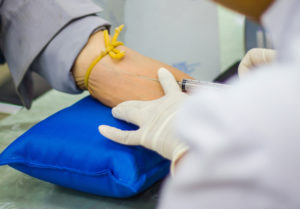
5 Ways to Raise Your HDL-Cholesterol Naturally
HDL, an abbreviation for high-density lipoprotein, is often referred to as the “good cholesterol,” since higher levels are associated with a lower risk of cardiovascular disease. This is in contrast to LDL, the so-called “bad cholesterol,” a different form that may play a role in causing heart disease. These terms actually refer to the lipoproteins that carry cholesterol through the body rather than the cholesterol molecule itself.
The reason we care about and measure HDL is that higher levels are associated with a lower risk of developing heart disease. One way in which HDL cholesterol may reduce the risk of cardiovascular disease is by removing cholesterol from the inner walls of arteries, blood vessels that carry blood. Once HDL picks up cholesterol from the arterial wall, it carries it to the liver where it can be broken down and eliminated. Plus, research suggests that HDL cholesterol may also have antioxidant and anti-inflammatory effects that help protect against cardiovascular disease.
Therefore, HDL plays a useful function in the human body. It helps clear cholesterol from the walls of arteries and keeps them healthy. Therefore, it is desirable to have a high ratio of HDL cholesterol relative to LDL cholesterol. Your physician can check these values with a blood test to see where you stand. If you find your HDL cholesterol is low, are there ways to raise it naturally? Here’s what science shows may help.
Lose Weight
If you’re carrying extra pounds of body weight, losing the excess weight may boost your HDL-cholesterol level, but the effects are modest. On average, you can raise your HDL level by about 13 percent through weight loss alone. But losing weight has other heart health benefits as well. Body fat produces inflammatory compounds that may contribute to cardiovascular disease. Recent research suggests inflammation can damage the inner walls of arteries and increase the risk of a heart attack or stroke.
Exercise
Exercise is a natural HDL booster. However, the greatest increase in HDL cholesterol comes from high-intensity exercise. In one study, 12 weeks of high-intensity exercise was linked with a 10 percent increase in HDL cholesterol in men. However, another group who did low-intensity exercise only experienced a boost in HDL of around 2 percent. So, taking a slow walk through the park is unlikely to boost your HDL by much, but taking part in vigorous activities on a regular basis likely will. Duration of exercise may be a factor too. One study found that the increase in HDL was proportional to how many weekly miles runners ran. The bottom line? Move more vigorously and do it more often!
Chuck the Bad Habits
If you’re a smoker, quit. Research shows smokers who kick the habit experience a modest increase in HDL cholesterol of around 6 percent. This occurs despite limited changes in LDL cholesterol. Smoking is risky to heart health for other reasons too. It constricts blood vessels and increases the workload on the heart. Smoking also raises blood pressure and has an inflammatory effect on blood vessels. Over time, smoking damages blood vessels throughout the body.
On the other hand, drinking modest quantities of alcohol, around an ounce per day, can boost HDL by up to 8 percent. However, you have to weigh the pros of drinking alcohol against potential risks. Alcohol in large quantities can cause liver damage.
Change Your Diet
An overall healthy diet of mostly whole, unprocessed foods has favorable effects on blood lipids in general. One of the most heart-healthy diets is a Mediterranean style of eating. The Mediterranean diet emphasizes fruits, vegetables, whole grains, nuts, fish, and olive oil. It de-emphasizes red meat, processed foods, and sugar. One study found that a Mediterranean eating plan lowered LDL cholesterol, a positive for heart health. Although it didn’t raise HDL, it improved the function of existing HDL. The results were strongest in those who consumed more extra-virgin olive oil.
Also, some but not all studies suggest that consuming more fatty fish, like wild-caught salmon, modestly boosts HDL cholesterol or improves how it functions. Taking a fish oil supplement may have similar benefits, although the results are most compelling when people eat fish in whole food form as opposed to taking a supplement.
Based on research, the benefits are greatest in people who consume fatty fish 4 or 5 times per week. You have to weigh this against the high mercury content of some fish. Mercury can accumulate in the body and cause health problems. Know which fish are high in mercury and follow the guidelines on how often you should consume each type of fish.
Watch Your Carbohydrates
At the very least, eliminate refined carbohydrates from your diet. Some research in diabetics suggests that reducing carbohydrates to under 50 grams per day can raise HDL cholesterol. In one study in diabetics, those who consumed a low-carb diet experienced twice the rise in HDL relative to those who ate a higher carb diet. But you may experience some improvement by simply watching the quality of the carbs you eat. Consume more non-starchy fruits and vegetables and fewer processed carbs and foods with added sugar. In other words, fewer packaged foods and trips through the drive-through!
Conclusion
Lifestyle can have an impact on your level of HDL-cholesterol. Although HDL-cholesterol appears to have a protective effect against cardiovascular disease, new research shows the size of a person’s HDL particles and how well they function may be a factor too. In other words, you may have a high HDL, but if your HDL isn’t very functional, it may not protect your heart as much.
It’s also not clear whether artificially raising your HDL, as through medications, has protective benefits. Hopefully, further research will sort these issues out. In the meantime, doing these five things should lower your risk of cardiovascular disease in general. So, take advantage of these natural ways to raise HDL and lower your risk of heart disease.
References:
Nutr Metab Cardiovasc Dis. 2014 May;24(5):554-62. doi: 10.1016/j.numecd.2013.11.003. Epub 2013 Dec 2
Medical News Today. “Nine Ways to Increase Your HDL Cholesterol Levels”
Am Heart J. 2011 Jan;161(1):145-51. doi: 10.1016/j.ahj.2010.09.023.
Science Daily. “Mediterranean Diet with Virgin Olive Oil May Boost ‘Good’ Cholesterol”
Am J Clin Nutr. 2015 Oct;102(4):780-90. doi: 10.3945/ajcn.115.112581. Epub 2015 Jul 29.
